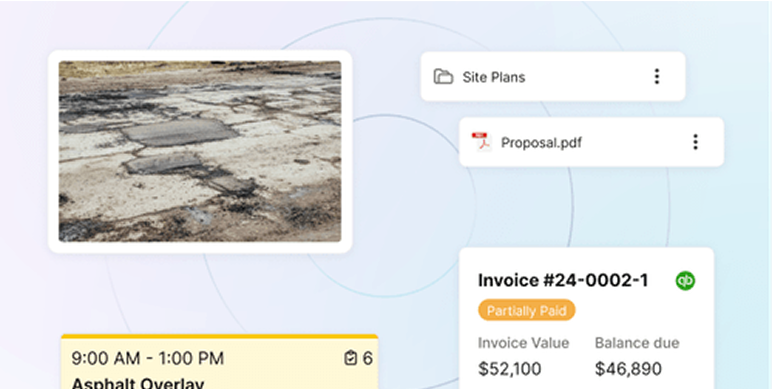6 Top Paving Machinery Brands and Models for 2026
Smart contractors pick brands for specific strengths and strategic advantages.
CAT wins on dealer support, durability, and resale value. Vögele stands out for automation and smooth mats. LeeBoy shines on commercial lots with compact, easy-to-run pavers that crews learn fast.
In this guide, we break down the top U.S. paving equipment manufacturers, their key models, and tips to match machinery to your projects. You’ll also learn how OneCrew’s platform helps assign, schedule, and manage paving machinery for your operations.
Top 6 Paving Machinery Brands: TL;DR
Here’s our at-a-glance guide. Match each brand to your job types, crew skill, and uptime needs. See full sections below for specs and model picks.
Key Considerations When Choosing Paving Machinery
When evaluating asphalt paving machinery (or concrete paving equipment), keep these factors in mind:
- Project scale and output requirements: Match machine size to job scope. For example, a compact blacktop paver suffices for driveways, while highway projects demand large asphalt paving machinery with higher throughput.
- Terrain and climate conditions: Consider the environment. Hilly or soft terrain favors tracked pavers for better traction, whereas wheeled pavers excel on firm, flat ground with faster repositioning.
- Maintenance and accessibility: Look for designs that simplify maintenance. Features like easy-access engine compartments, auto-lubrication systems, and modern diagnostics reduce downtime.
- Operator skill level and training: Advanced machines with automations can boost efficiency, but demand trained operators. If your crew is less trained, focus on user-friendly controls and consider gear with training programs.
- Budget vs. long-term ROI: Balance upfront cost with lifespan and resale value. A cheaper unit might save money now, but could incur higher repair costs or slower production. Investing in a proven, durable paver can yield a stronger long-term ROI.
The 6 Most Popular Paving Machinery Companies
The following leading brands dominate U.S. paving machinery in 2026. We summed up their key models and features, and who benefits most from each.
1. Caterpillar (CAT)

Caterpillar is a global heavyweight in construction equipment, with a robust paving products line. CAT asphalt pavers are renowned for heavy-duty build, high resale value, and an extensive dealer network across the U.S.
Key models and specifications
Key features
- Mobil-Trac™ undercarriage: CAT’s rubber-track system on models like the AP455 and AP1055 maximizes traction and smooth ride. The design floats over uneven ground and improves ground contact, which is crucial for quality paving and also extends track life.
- Advanced material flow control: Cat pavers use design tweaks to ensure uniform asphalt flow. For instance, a low dump hopper and smaller-diameter augers in new models help prevent segregation by moving mix at both narrow and wide paving widths.
- Operator-friendly technology: Caterpillar integrates helpful automation to reduce skill barriers. Pave Start Assistant allows even less-experienced operators to get optimal settings quickly.
- Transport and uptime focus: Many CAT pavers are designed with transportability and service in mind. The compact line (AP400–AP555) keeps machine size under transport thresholds, so you can move between jobs without escorts.
Ideal users: Caterpillar pavers are a top choice for mid to large contractors who demand reliability and dealer support.
A CAT paver makes sense if you tackle a variety of projects (e.g., state DOT highway jobs one week and subdivision streets the next) and need a machine that performs under heavy use. The brand’s emphasis on durability and resale value appeals to owners looking at total lifecycle cost.
2. Vögele (Wirtgen Group)
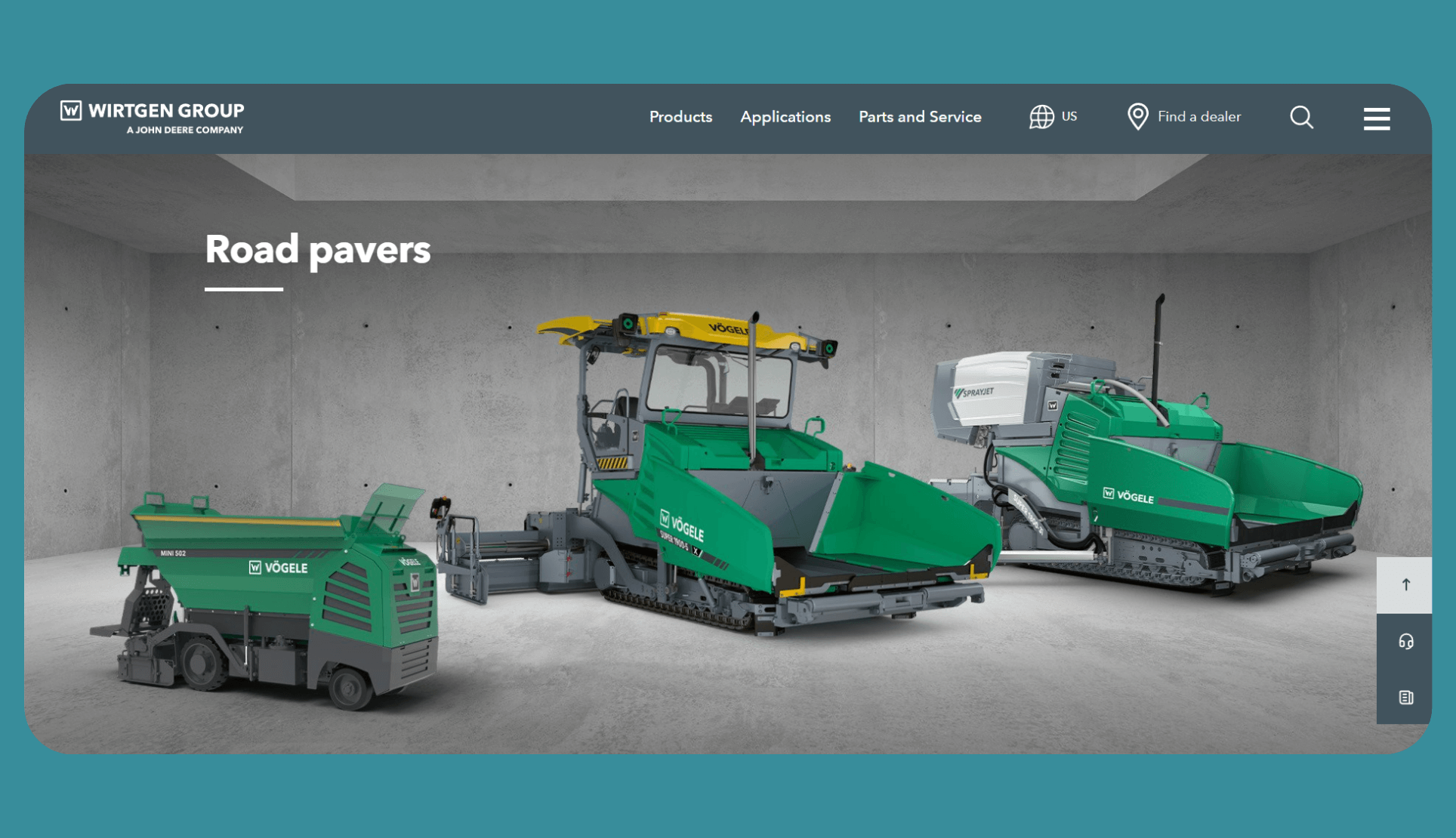
Vögele, part of the Wirtgen Group (now under John Deere), is a German-origin brand synonymous with advanced asphalt pavers. Vögele offers one of the widest product ranges in the industry, from mini pavers for pathways to eight-meter-wide highway class pavers.
Key models and specifications
Key features
- Wide range and modular design: Vögele’s lineup is divided into Mini, Compact, Universal, Highway, and Special classes, covering pave widths from 0.25 m to 18 m (10″ to 59′).
- Dash 5 generation automation and safety: The latest “-5” series pavers emphasize automated features and operator health. Dash 5 pavers boast a higher level of operating comfort and shorter setup times than their Dash 3 predecessors.
- Anti-segregation and mat quality focus: A hallmark of Vögele is its attention to mat quality. Even older models feature innovations like the dual-shaft Vögele tamper system and electric screed heating for uniform density and texture.
- Telematics and fleet connectivity: As part of the Wirtgen Group, Vögele pavers can integrate with WITOS telematics and JOYTRONIC systems that monitor paving progress, machine status, and even mix temperature.
Ideal users: Vögele pavers attract contractors who prioritize technology and precision. If you’re an asphalt contractor aiming for smoothness bonuses or tackling jobs with stringent quality specs, Vögele’s high-tech approach is appealing.
3. LeeBoy
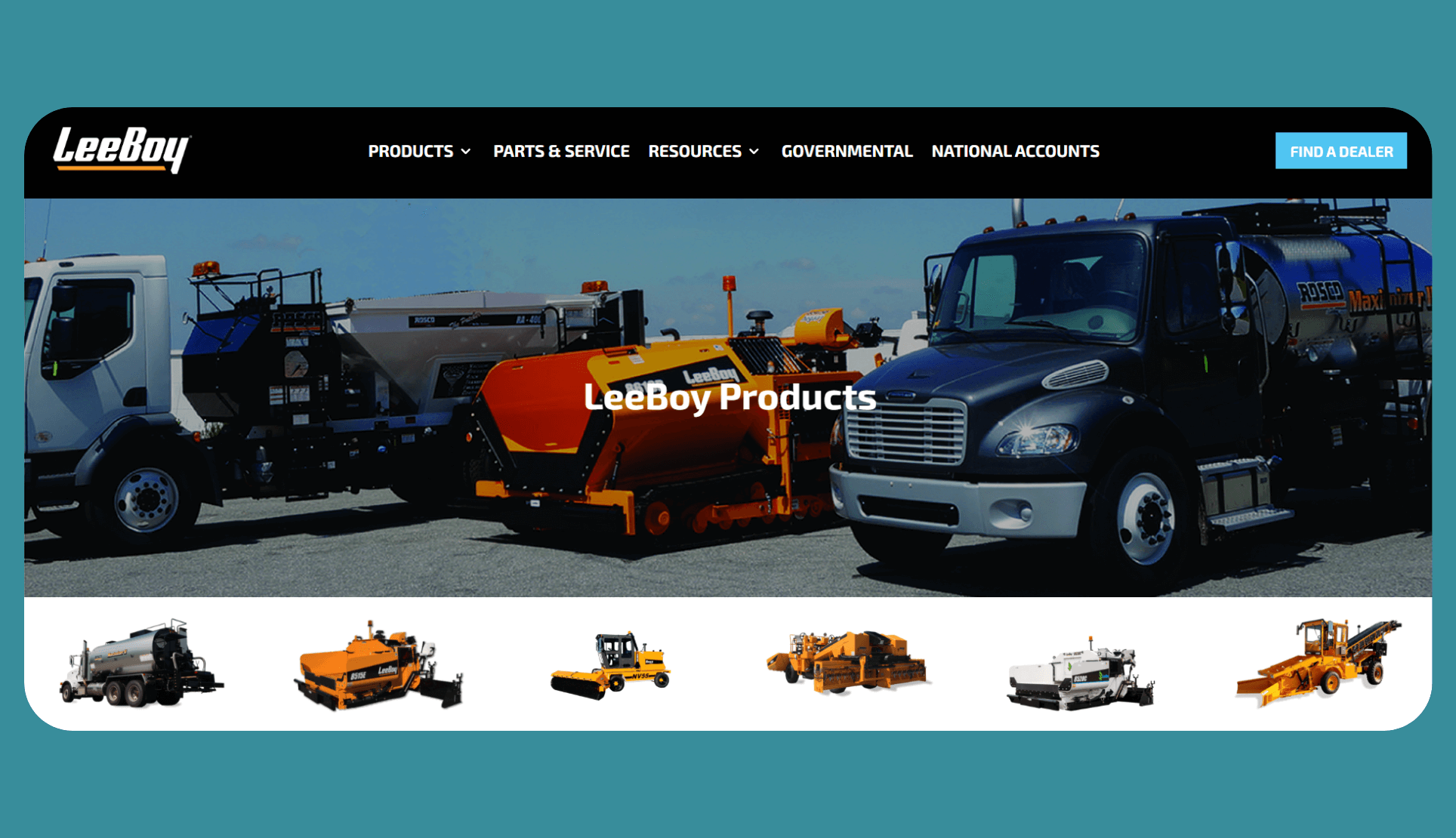
LeeBoy is a U.S.-based manufacturer known for its commercial-grade asphalt pavers and road maintenance equipment. LeeBoy pavers are beloved by small to mid-sized contractors for their ease of use, compact footprint, and reliability on projects like driveways, parking lots, and secondary roads.
Key models and specifications
Key features
- User-friendly design: LeeBoy machines are famed for being operator-friendly. The control layout is straightforward, often using analog switches and gauges that seasoned paver operators appreciate (no steep learning curve).
- Heavy screed, quality mat: LeeBoy’s Legend Screed technology is a selling point. These screeds (often electrically heated) are heavier than most in their class, which helps achieve a smooth, well-compacted mat behind the paver.
- Compact footprint and maneuverability: Built with commercial paving in mind, even the larger LeeBoy models maintain relatively compact dimensions. Most models are under 10′ long and around 8′ wide in transport.
- Cost-effective and easy maintenance: LeeBoy pavers tend to have lower acquisition and upkeep costs compared to big-brand highway pavers. These pavers use reliable engines and hydraulics, which most diesel mechanics can service.
- A Reddit user mentioned using CAT pavers alongside Leeboy. In a recent post, he stated, “We run CAT ap 1000 pavers and a Leeboy 8520 for smaller stuff.” (February 23, 2026)
Ideal users: LeeBoy is ideal for small to mid-sized paving contractors focusing on commercial and municipal projects. If you pave lots of driveways, parking lots, bike paths, or subdivision roads, a LeeBoy paver’s size and output are a perfect match.
4. Wirtgen
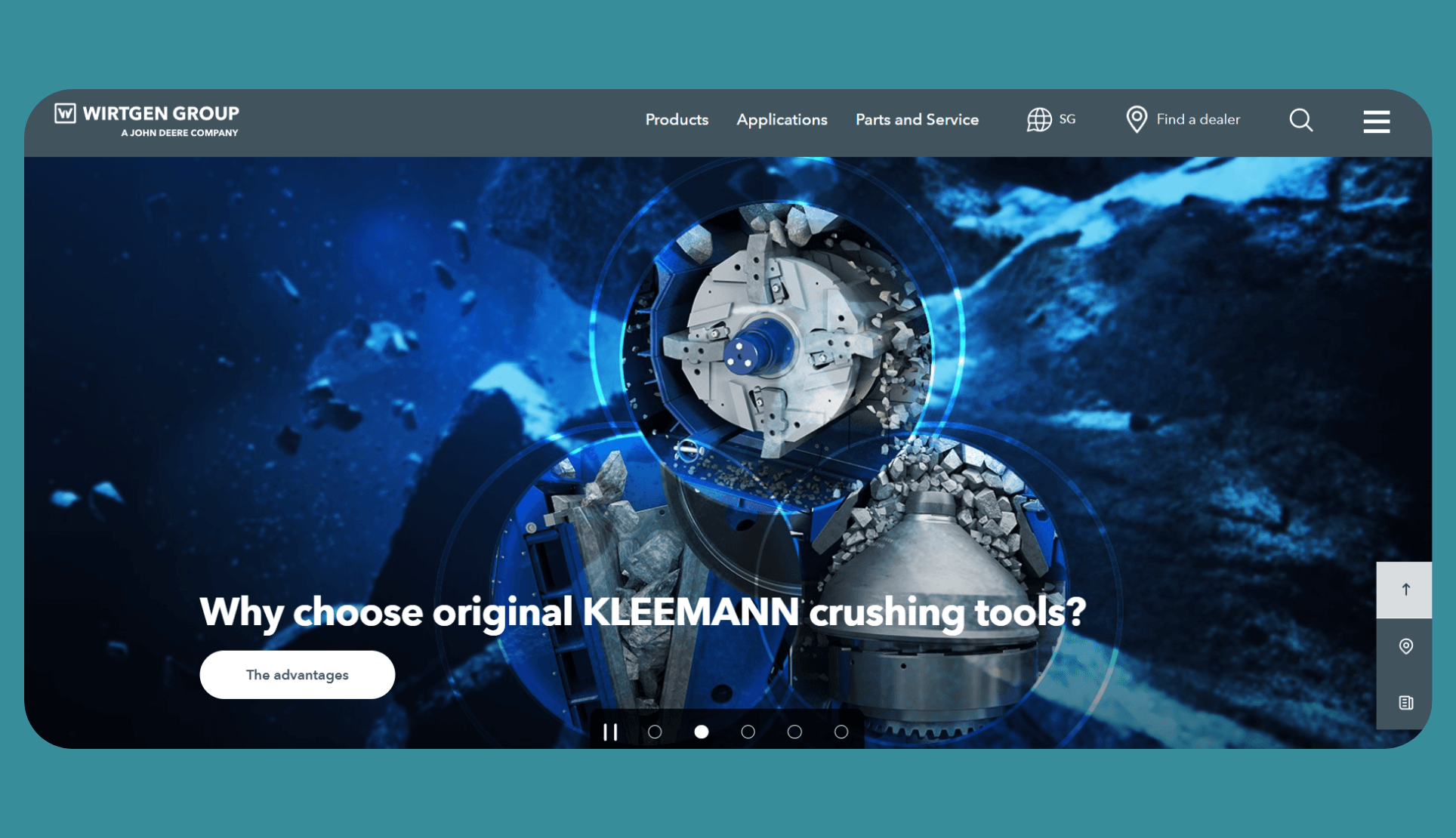
Wirtgen builds the machines that prep, recycle, and pave concrete at scale. Think cold milling for removals, in-place recycling and soil stabilization, and slipform pavers for highways and airports.
Key models and specifications
Key features
- MILL ASSIST: It automates engine, drum speed, drive, and water systems to optimize cost, output, or mat quality on W-series mills. WPT (Wirtgen Performance Tracker) documents production for reporting and costing.
- High-output recycling: The WR series handles tough soil stabilization and in-place cold recycling with precise binder/water metering.
- Modular slipform paving: The SP paver enables fast reconfiguration, precise steering/control, dowel/tie-bar insertion, and 3D guidance for concrete pavements.
- “Vögele has revised and upgraded the machine again. Everything is state-of-the-art, and it is now even easier to use.” – Bahtiyar Kadyrbekov, Dorstroy LLC (Bauma, 2026)
Ideal users: Wirtgen is good for those who manage full-depth rehab or concrete paving in addition to asphalt placement. Highway-class contractors, DOT work, and firms investing in cold recycling or soil stabilization benefit most from Wirtgen’s automation, reporting, and concrete paving lineup.
5. Dynapac
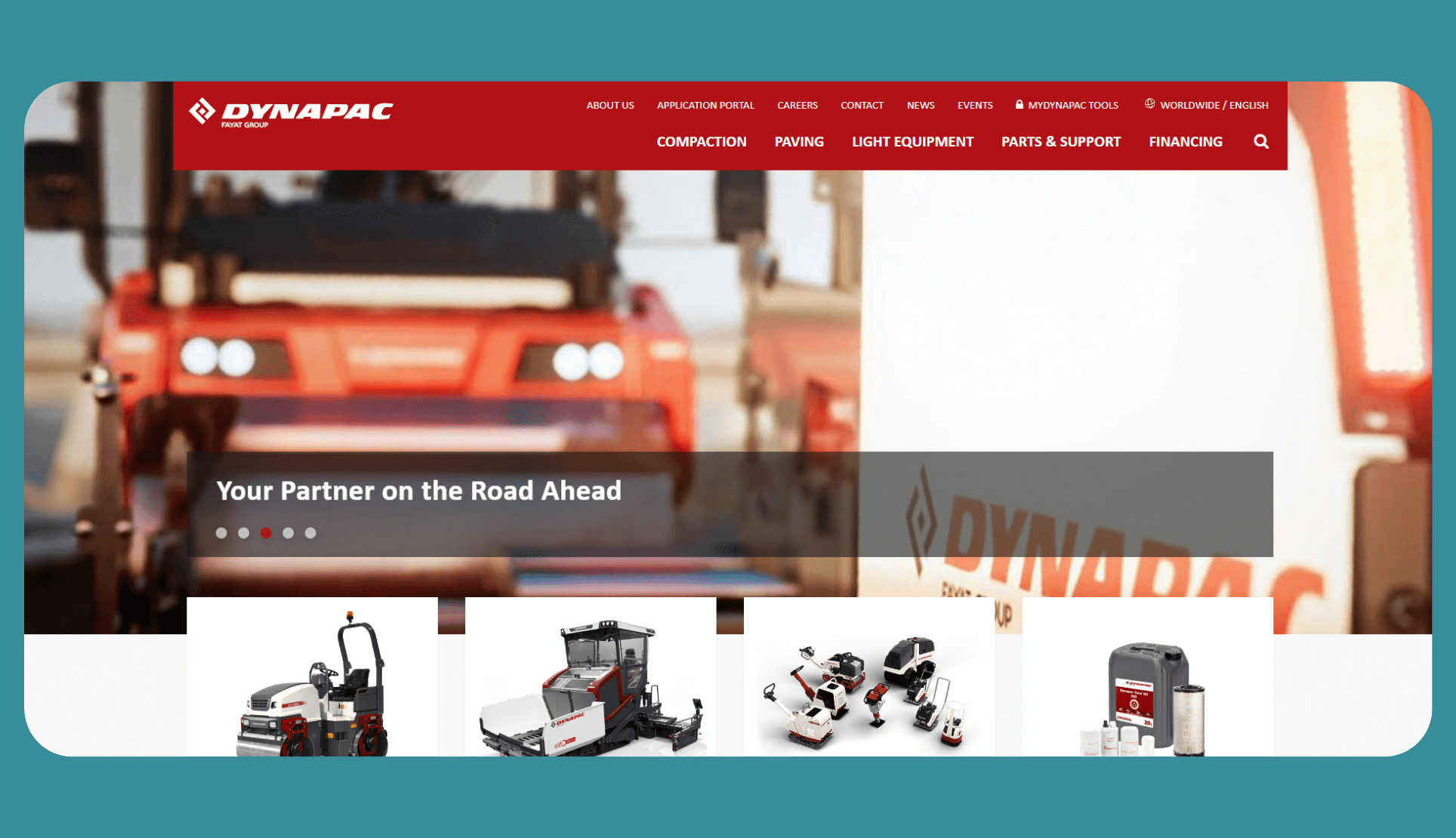
Dynapac has a long history in road construction equipment, especially known for its asphalt rollers. In the paving arena, Dynapac’s latest North American pavers are making waves with innovative features aimed at maximizing uptime and mat quality.
Key models and specifications
Key features
- Smart paving tech: Dynapac’s new pavers come loaded with automation to reduce operator workload. The PaveManager suite acts as the brain of the paver: it monitors material flow, machine speed, and screed settings, and can automate certain tasks.
- High uptime design: Dynapac has prioritized reliability. The D-Series features a heavy-duty frame and wear parts built for longevity. Extended wear-life auger flights, thicker conveyor chains, and easy-change floor plates all contribute to lower downtime.
- Operator comfort and visibility: Dual swing-out operator consoles are standard, giving a clear view down either side of the machine. The seats are suspension-mounted and the platforms have shock absorbers, offering a comfortable ride even on a rough base.
- The SD2500CS is much more ergonomically designed than competitive machines. – Michael Brake, Site Manager, Dallmann (November 16, 2023).
Ideal users: Dynapac paving equipment is well-suited for contractors who value innovation but also practicality. Medium and large paving companies that work on DOT projects will appreciate the highway class D30 pavers; they deliver high throughput and integrate smoothly into modern, sensor-controlled paving trains.
6. Weiler
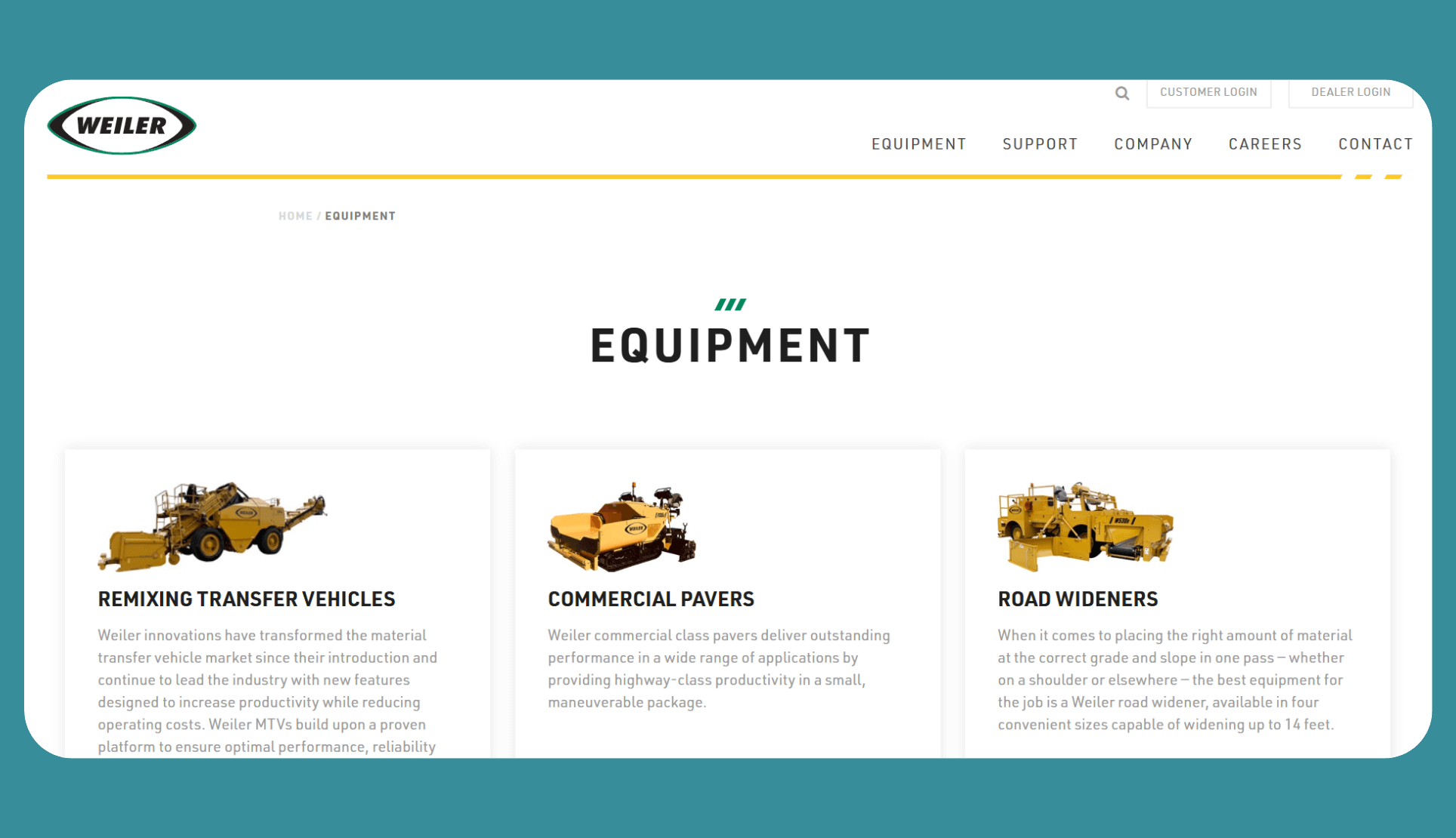
Weiler is a lesser-known name globally, but in U.S. paving circles, it’s gaining prominence. Based in Iowa and distributed through CAT dealers, Weiler produces a specialized range of commercial pavers, material transfer vehicles, and road wideners
Key models and specifications
Key features
- Niche-focused engineering: Weiler thrives by focusing on specific paving niches – commercial pavers, road wideners, and MTVs; and engineering them to excel in those roles.
- Integration with CAT ecosystem: One big advantage of Weiler equipment is that it’s sold and serviced exclusively through CAT dealers in North America. This means when you buy a Weiler paver or MTV, you get the same level of support as any CAT machine.
- Innovative features for productivity: Weiler isn’t afraid to innovate. A good example is the insulation monitoring system on the P385C’s screed heating. Rather than using GFCI outlets that can trip, the system actively monitors insulation resistance to preempt electrical issues.
Ideal users: Weiler primarily caters to contractors in the commercial paving and mid-level roadwork sector, and to larger contractors seeking a dependable material transfer or widening solution.
If you’re a paving company doing lots of city streets, county roads, and parking lots, a Weiler P265 or P385C could be a perfect fit.
How We Selected This Paving Machinery
Performance and productivity
Performance includes the paver’s ability to place a consistent mat (tons per hour, paving width, layer thickness) and its power to push loaded trucks.
High productivity means the machine can pave quickly without compromising quality, critical for meeting project deadlines and maximizing the paving window (especially in regions with short seasons).
How we tested the machines: We compared official spec sheets and real-world reports on output. This included looking at engine horsepower and torque (to gauge pushing power), maximum paving speeds, hopper capacity, and conveyor/auger throughput.
Durability and uptime
The harsh nature of asphalt paving means equipment must be built tough. Durability refers to the machine’s build quality and component longevity; things like frame strength, wear resistance of augers and screeds, and robustness of electronics.
Uptime is the flip side; it’s how often and how easily the machine needs maintenance or repairs. A paver that breaks down frequently can derail a project and eat into profit margins.
How we tested the machines: We scrutinized manufacturer design features geared toward durability, such as all-welded high-strength steel frames, heavy-duty crawler tracks, and warranty terms.
Technology and user-friendliness
A highly automated or tech-integrated paver can help achieve better pavement smoothness, optimal material usage, and easier training of operators (crucial, given the skilled labor shortage).
However, technology is only valuable if it’s user-friendly. Complex systems must be intuitive, or they won’t be fully used by crews. Thus, this criterion looks at the balance of advanced features with practical, easy controls that reduce operator fatigue and error.
How we tested the machines: We evaluated what each brand offers in terms of onboard technology, e.g., automatic feed systems, screed automation, assistive sensors, telematics connectivity, and integration with GPS grade control.
Methodology
Our evaluation combined specification analysis, expert input, and field observations. We reviewed the latest spec sheets and product brochures (2023–2026) for quantitative metrics.
We consulted paving experts, including a DOT paving inspector and two veteran paving superintendents, to get qualitative insights on which features truly matter on the job.
Machinery Recommendations by Use Case
Here are our tailored recommendations based on common scenarios:
- Choose a Caterpillar AP1055 or Dynapac D30T if you pave highways or interstates regularly. These 10-foot, high-output pavers shine on large-scale projects. These machines offer robust engines (~225 hp) and wide paving widths to cover lanes quickly.
- Choose a Vögele Super 1700-3i or LeeBoy 8520C if you handle mostly city streets and commercial lots. An 8-foot class paver is ideal for municipal work; it’s compact enough for urban streets yet capable of decent production.
- Choose a Weiler P385C or LeeBoy 8510 if you primarily do driveways, small lots, and patching. These machines are essentially “Goldilocks” for small asphalt contractors: not too big, not too small. The Weiler P385C’s 120 hp power and superior traction will tackle steep driveways or cul-de-sacs with ease.
How OneCrew Keeps Your Paving Fleet Working at Full Capacity
Even the best machinery needs proper management to deliver results. OneCrew is a platform tailored for paving contractors that can transform how you manage your paving equipment fleet day-to-day. Here’s how OneCrew makes equipment management easier:
- Assign machines and crews to jobs with ease: OneCrew lets you schedule which paving machine and crew are going to which project on a visual calendar. Drag-and-drop functionality means if rain pushes Monday’s paving to Tuesday, you can reassign your CAT paver and crew in seconds.
- Track usage by job for better costing: Each time your asphalt paver or roller is used, OneCrew can log the hours and even link them to specific job IDs. Over time, you’ll gather data on how much machine time a certain type of project typically requires.
- Prevent double-booking and downtime: OneCrew’s scheduling tools will flag conflicts in advance. This allows managers to shuffle resources proactively or arrange rentals if needed. The result: Each machine is used optimally, and downtime is minimized.
OneCrew was built for paving contractors who need visibility and control over every project. If you want to cut downtime and keep your paving machinery working at full capacity, book a free demo today and see how OneCrew can simplify your operations.
FAQs
1. What’s the difference between tracked and wheeled asphalt pavers?
The difference between tracked and wheeled asphalt pavers is in traction and mobility. Tracked pavers work best on soft or uneven bases, whereas wheeled pavers move faster and suit firm, flat ground. Choose tracked for stability and wheeled for speed and easier transport.
2. Can the same paving machinery be used for concrete paving?
No, the same paving machinery cannot be used for asphalt and concrete paving. Asphalt pavers spread hot asphalt with a screed; however, concrete paving machinery uses slipform extrusion and vibration. Contractors need separate machines for each material.
3. What’s the best paver size for a small paving crew?
The best paver size for a small paving crew is an 8-foot commercial-class paver. Models like the LeeBoy 8510 or Weiler P385C balance cost, ease of use, and width range for driveways and small lots. These machines boost productivity without requiring large crews.
4. What does a Material Transfer Vehicle (Shuttle Buggy) do?
A Material Transfer Vehicle (MTV) keeps asphalt mix flowing smoothly from trucks to the paver. It stores and remixes material to prevent segregation and guarantees continuous paving. DOT highway projects often require one for quality and consistency.
5. How should I maintain my asphalt paver?
You should maintain your asphalt paver with daily cleaning, lubrication, and fluid checks. Crews should scrape asphalt buildup, grease bearings, and monitor track or tire condition. Following the manufacturer’s schedule prevents downtime and extends machine life.
6. How can I manage the scheduling and use of paving machinery?
You can manage the scheduling and use of paving machinery with a central platform like OneCrew. It assigns machines to crews, prevents double-booking, and tracks hours per job. This ensures every paver and roller is used effectively.


